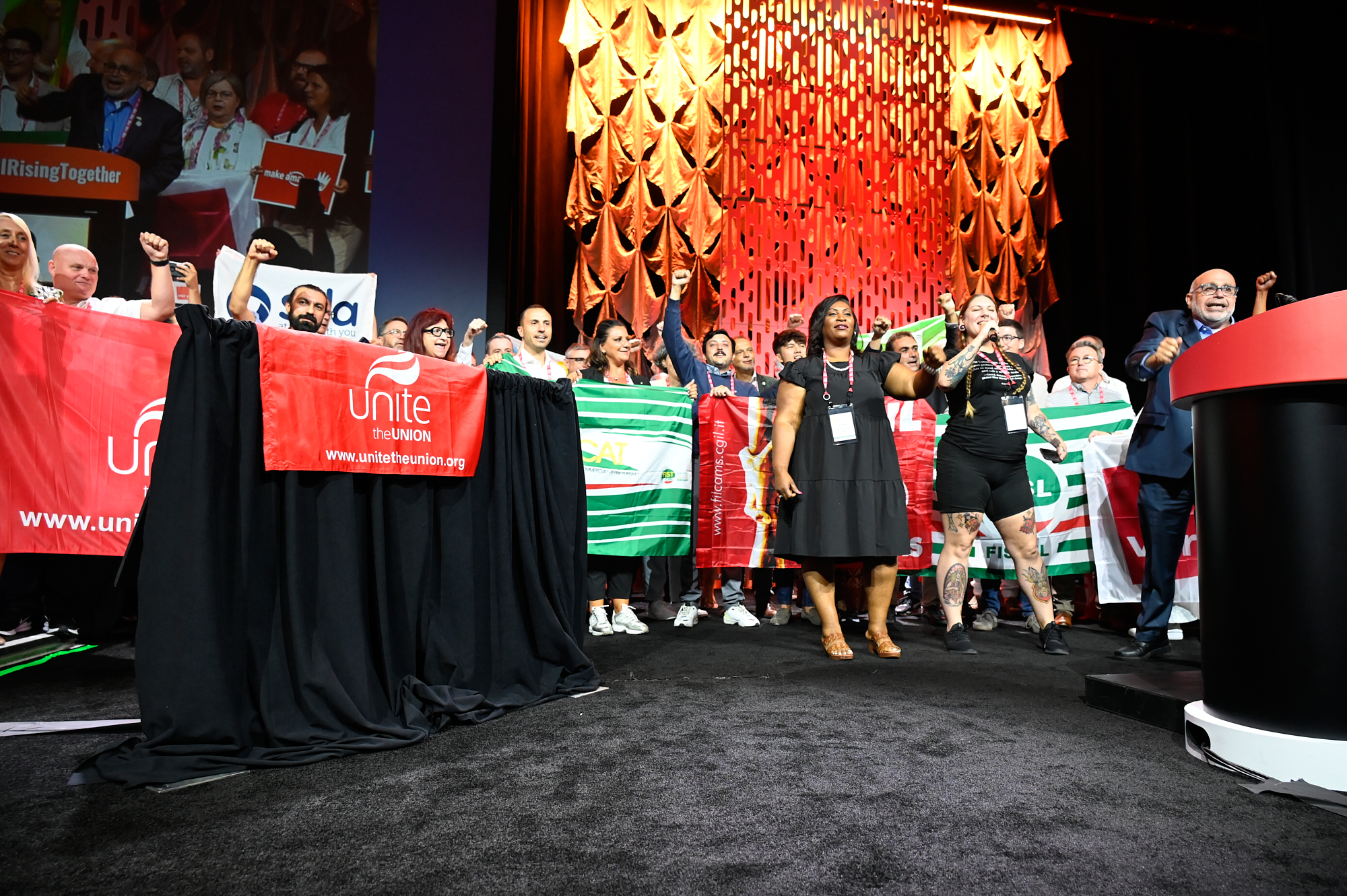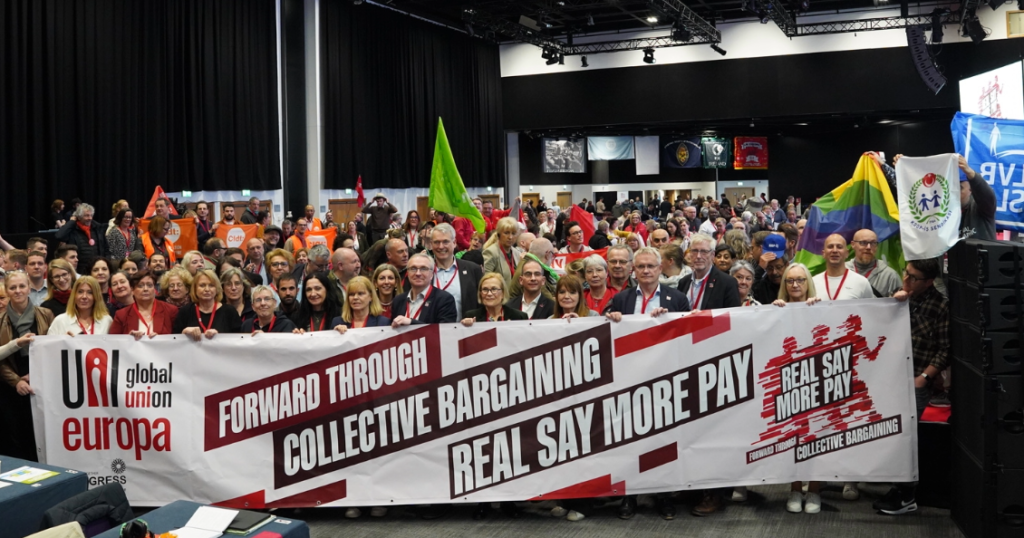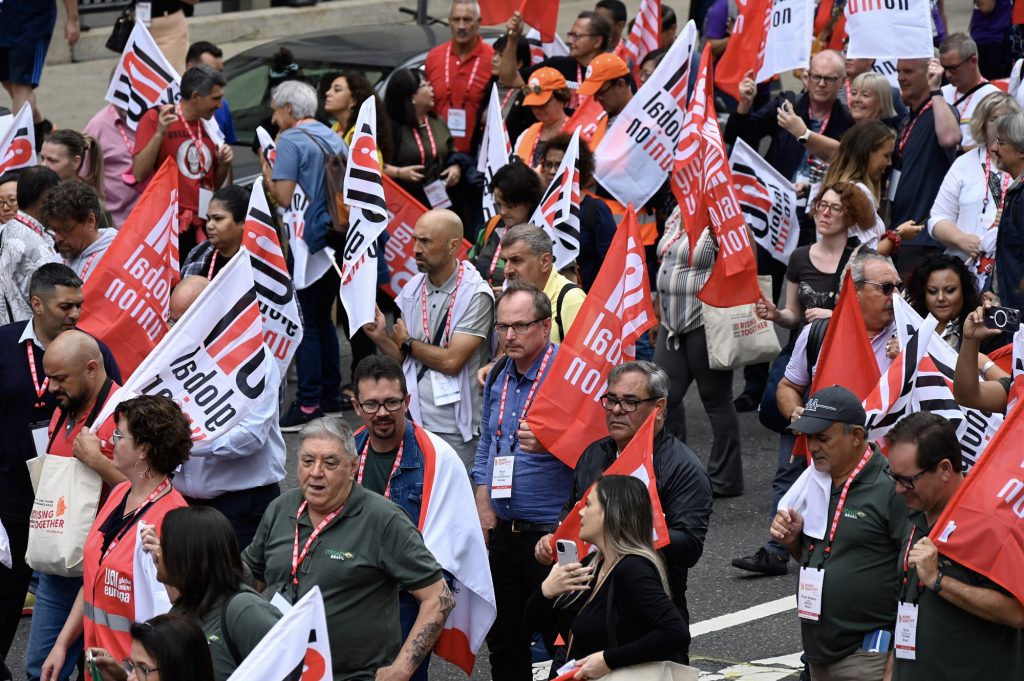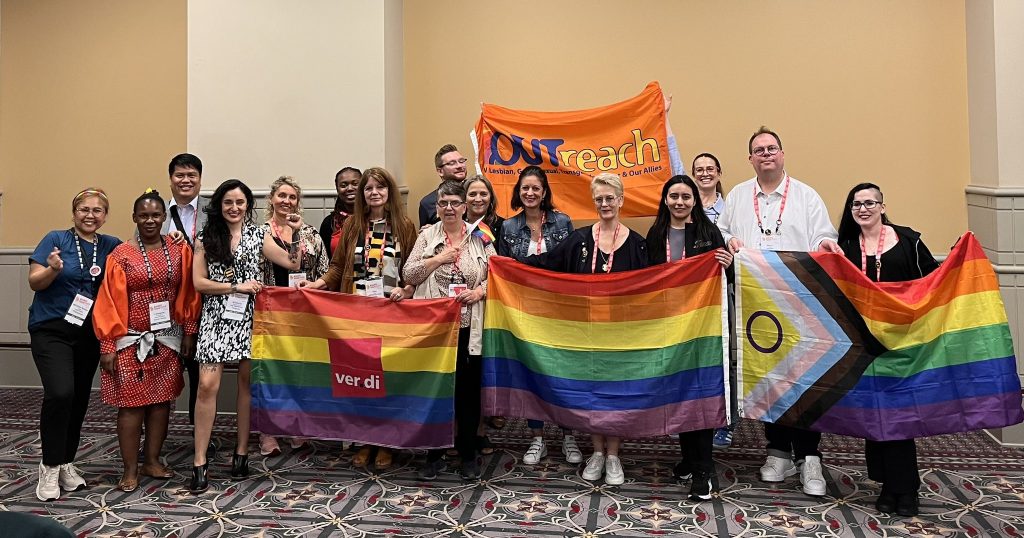Organizing, Gender equality and Amazon workers rising: Day 1 of UNI’s World Congress

Day 1 of UNI Global Union’s 6th World Congress kicked off in Philadelphia, with an action packed agenda under the themes of union power, women’s rights and the fight to Make Amazon Pay.
“We come together in this Congress to chart the next four years but also to celebrate and to recommit to the power of global unionism. Because even though the forces aligned against workers are big, we are bigger. The largest democratic movement in the world. And we have the potential to be even bigger. We must be united and strategic. We won’t win these goals by asking politely. We will need to fight. When we fight, we win,” said UNI’s General Secretary Christy Hoffman.
“Our mission is to strengthen unions in order to improve workers’ lives and shift the balance in global power. And this means not just talking about it, but actually making a difference. Getting things done. And we are doing that.”
The first part of the day ‘Building Union Power for All’ was moderated by Rocio Sáenz, Executive Vice President, SEIU (USA), and shone the spotlight on the organizing successes of UNI affiliates across the regions.
Tony Clark the Executive Director of the Major League Baseball Players Association and President of UNI’s World Players Association, explained how their union organized the minor leagues for the first time ever: “We were fortunate enough to get our first contract. Health benefits, pension, doubling or tripling compensation overnight. And it wouldn’t have happened without having the right leadership, the right players.”
Taketoshi Matsuzaka, from the commerce division of UA ZENSEN spoke about the historic pay rises for workers during this year’s sector wide wage negotiations, which take place every spring. “Our Spring Offensive really put the spotlight of union activities in Japan – and on the radar of young workers, as well as part time workers that are outside the trade union movement,” said Matsuzaka.
Organizing through global agreements
UNI’s global agreements with multinational companies play a transformative role in supporting workers who are organizing in challenging environments. Cristina Gogescu, General Secretary of FSC in Romania, described how UNI’s global agreement with supermarket retailer, Auchan, opened the door to establish a union at the supermarket chain in March this year:
“Our target is to get at least 35 per cent membership by April next year so that we can start negotiating a collective agreement. So far numbers are growing steadily and we are confident we will get legal recognition as planned.”
Similarly, Liz Passaro from SutraH&M (Peru) shared her union’s winning campaign, which was supported by UNI and leveraged the global agreement with Swedish fast-fashion giant H&M: “We were able to sign our first collective agreement and first salary increase in over six years and the company is committed to staying neutral.
UNI Organizing Centres
UNI’s world-beating regional organizing centres in Eastern Europe (COZZ and UNISEEOC), Colombia (COE) and Western Europe (EPOC) were recognized for their impactful work in building trade unions on the ground.
“We have organized greenfield non-union sites in Poland, Hungary and Czechia in the Care, ICTS, Graphical & Packaging, and run infill campaigns in Commerce and Finance. In the last year alone COZZ has successfully organized Thales in Poland, Elanders in Hungary and Alzheimer Care homes in Czechia. We have six ongoing campaigns including Google and Orpea. The strategy is not simply succeeding in few companies, sector or country, we aim at resilient trade union structures throughout Europe that can withstand any new assault of neo-liberalism,” said Oliver Roethig, Regional Secretary of UNI Europa.
“Our Breaking Through organizing campaign is one of most important strategies set by the unions in the world. Implementing this, we expect to build workers’ power that can make real change in the life of people. That helps us fight against inequality and poverty. COE is part of our broader strategy that has more 70 people working in Americas, helping unions to develop organizing, to reach better Collective Bargaining and to protect democracy,” said Marcio Monzane, Regional Secretary of UNI Americas.
Carol Scheffer, from UNI’s Irish affiliate, the Communication Workers Union, explained:
“The benefit of EPOC is that it will develop this capacity within all levels of our unions from grass root representatives to more senior union officials. This approach ensures that we have to a consistent and common understanding of how we can best grow worker power.”
Global alliances
The Congress also highlighted the importance of international networks and global solidarity to build power. UNI’s DHL Alliance in Africa has achieved remarkable success in organizing unions at the world’s biggest logistics company, expanding from five to 32 countries on the continent so far.
“It’s important for us to have international alliances. In many countries there are a lot more people who can benefit from the freedom to organize and many will benefit from having unions,” said Ibrahima Sarr from SNTPT, in Senegal .
Rosalina Ngakopu, from E tū in New Zealand spoke of her union’s campaign to secure a Fair Pay Agreement for security guards, which lays the ground for national bargaining on a sector-wide level. E tū has been supported by UNI’s U.S. affiliate SEIU along the journey.
“In 2022 our strong Pacifica female leaders did the E tū oral submissions for FPAs to Parliament’s select committee hearings. We went hard and strong, we did not care about the push backs, the push backs inspired us to work harder to achieve what we have set out to do,” said Ngakopu.
UNI also used the occasion to launch a new fundraising initiative to allow individuals to show their global solidarity and boost organizing capacity around the world through a financial contribution online.
UNI’s Breaking Through Awards for organizing against the odds were awarded to unions in Finland, Nepal, Uganda, as well as Jobs with Justice, a labour movement in the U.S.. Executive Director Erica Smiley, expressed her gratitude for the recognition, stating:
“Receiving this award From UNI Global Union is truly an honour and testament to the visionary labour, community, faith and student leaders who sought to build a network of nimble organizations and unions that would collaborate as equals around a shared vision for expanding organizing a collective bargaining power for everyone and a commitment to creative approaches that would match the experiences and conditions of the modern worker.”
Women Rising
In the afternoon, Theresa Mortimer, BFSU (Bahamas), introduced the UNI World Women’s Conference motion on Rising Together for Equality through Collective Bargaining, which advocates bargaining with a gender perspective:
“When we include the needs of women in our agreements, we are impacting not only them, but entire families and communities, and we are opening doors for women to join the trade union movement,” said Mortimer.
A panel discussion went on to highlight women’s issues that are often ignored in the workplace. “Infertility, miscarriages, abortions and stillbirths can have devastating physical, and emotional effects on the mother who may take months to recover physically and much more to recover emotionally and psychologically from the loss,” said Patricia Nyman from SACCAWU (South Africa).
Alejandra Estoup from La Bancaria (Argentina) added: “We have negotiated clauses to help women in this process. From egg freezing treatment leave, in which women have one working day leave with full pay to undergo this practice, to surrogate gestation leave when having a child via a surrogate mother.”
Ruksana Perven, from GPEU in Bangladesh explained how she led a campaign for better and safer sanitary facilities in garment factories: “This is why the women’s group in our union fought for this. Because as women they understood how important this issue is. Today we have our own bathroom. We can change when we need, take bathroom breaks when our body demands it and most importantly, we don’t feel vulnerable or exposed.”
Unions around the world are also increasingly taking a stand to support victims of domestic violence. Carol Sheffer from CWU said: “Ireland will introduce legislation in the autumn for five days paid domestic violence leave. This will be at full pay and can only be described as a victory for the victim, the employer, and for the Irish trade union movement. It is also a win for collective bargaining without which many victims would continue to suffer in silence.”
#MakeAmazonPay
The curtains drew to a close on the first day of Congress with an impassioned session on global titan, Amazon.
The discussion was spearheaded by Stuart Applebaum, President of the Retail, Wholesale and Department Store Union (RWDSU) in the USA, who emphasized the pressing need to continue to hold Amazon accountable for its actions.
“There is no corporation in the world that embodies the injustices and excess of the 21st century economy more than Amazon. Whether its vicious anti-unionism, brutal productivity targets, worker surveillance, use of precarious labour, monopolistic business practices, tax avoidance, or extreme green washing. This corporation is a threat to workers, our communities, our planet, and our future,” said Applebaum.
“I’ve never worked for a company willing to spend millions of dollars in union busting. So I when organizing started I had to decide: quit and move on or stay and fight for justice – and I stayed,” said Jennifer Bates, an Amazon warehouse worker and RWDSU worker leader in Bessemer, Alabama.
Stefaine Nutzenberger from ver.di (Germany) spoke for the need to push back against Amazon’s excessive surveillance and pernicious management by algorithm: “We don’t want a world where Amazon is allowed to watch what we do and not provide decent work to its workers. We are going to fight for collective bargaining agreements at Amazon. And it started with us in Germany. With workers who stood up and heard the call to strike.”
Providing a local perspective, Jessie Moreno, Teamsters (USA), demanded Amazon be held accountable for all of its workforce: “We deliver Amazon packages, driving Amazon vehicles and they continue to say to the world that we aren’t Amazon workers. We need change and the time for that change is now.”
Andrea Borghesi, General Secretary of NIdiL/CGIL said at the panel: “we are stronger and more motivated than when we started. The fight is not just in one sector, we have to bring our different together to win at Amazon.”



